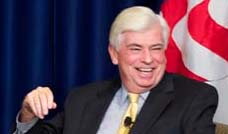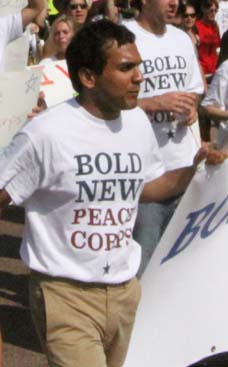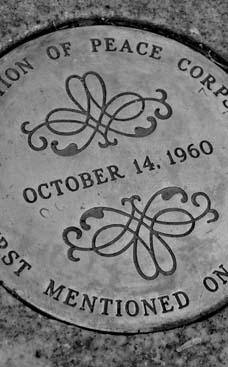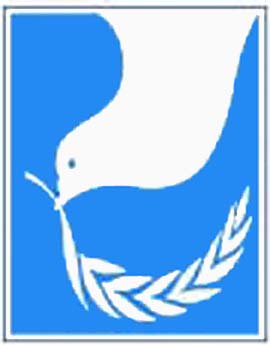
As the Peace Corps' Founding Director Sargent Shriver laid the foundations for what arguably became the most lasting accomplishment of the Kennedy presidency. As the Peace Corps approaches its 50th anniversary this year, more than 200,000 Americans have served as corps volunteers in 139 countries. Break mirrors, Mr. Shriver advised graduating students at Yale in 1994. "Yes, indeed," he said. "Shatter the glass. In our society that is so self-absorbed, begin to look less at yourself and more at each other. Learn more about the face of your neighbor and less about your own."
Sargent Shriver Dies
R. Sargent Shriver, Peace Corps Leader, Dies at 95
By ROBERT D. McFADDEN
Published: January 18, 2011
R. Sargent Shriver, the Kennedy in-law who became the founding director of the Peace Corps, the architect of President Lyndon B. Johnson's war on poverty, the United States ambassador to France and the Democratic candidate for vice president in 1972, died Tuesday. He was 95.
His son Anthony confirmed Mr. Shriver's death to The Associated Press.
Mr. Shriver, who lived in , was found to have Alzheimer's disease in 2003. That fall, white-haired and elegantly attired, he attended the inauguration of his son-in-law, Arnold Schwarzenegger, as the Republican governor of California. But in recent years, as his condition deteriorated, he withdrew from his long life of public service.
Married to President John F. Kennedy's sister Eunice for 56 years, he was bound inextricably to one of the nation's most powerful political dynasties. It was an association with enormous advantages, thrusting him to prominence in a series of seemingly altruistic missions. But it came with handicaps, relegating him to the political background and to a subordinate role in the family history.
"Shriver's relationship with the Kennedys was complex," Scott Stossel wrote in "Sarge: The Life and Times of Sargent Shriver," a 2004 biography. "They buoyed him up to heights and achievements he would never otherwise have attained - and they held him back, thwarting his political advancement."
The book and reports in The New York Times, The Washington Post and other publications suggested that Mr. Shriver's hopes to run for governor of Illinois in 1960 and vice president in 1964 and 1968 were abandoned to help promote, or at least not compete with, Kennedy aspirations. Mr. Shriver's vice-presidential race in 1972, on a ticket with Senator George S. McGovern, and a brief primary run for president in 1976 were crushed by the voters.
Mr. Shriver was never elected to any national office. To political insiders, his calls for public service in the 1960s seemed quixotic at a time when America was caught up in a war in Vietnam, a cold war with the Soviet Union and civil rights struggles and urban riots at home. But when the fogs of war and chaos cleared years later, he was remembered by many as a last vestige of Kennedy-era idealism.
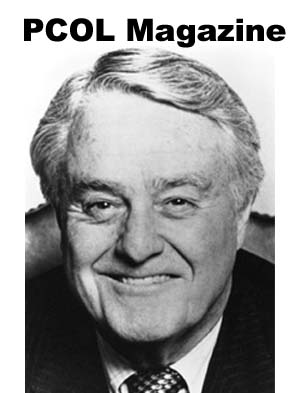
His impact on American life was significant. On the stage of social change for decades, Mr. Shriver brought President Kennedy's proposal for the Peace Corps to fruition in 1961 and served as the organization's director until 1966. He tapped into a spirit of volunteerism, and within a few years thousands of young Americans were teaching and working on public health and development projects in poorer countries around the world.
After the president's assassination in 1963, Mr. Shriver's decision to remain in the Johnson administration alienated many of the Kennedys, especially Robert, who remained as the United States attorney general for months but whose animus toward his brother's successor was profound. But Mr. Shriver's responsibilities deepened. In 1964, Johnson persuaded him to take on the administration's war on poverty, a campaign embodied in a vast new bureaucracy, the Office of Economic Opportunity.
From 1965 to 1968, Mr. Shriver, who disdained bureaucracies as wasteful and inefficient, was director of that agency, a post he held simultaneously until 1966 with his Peace Corps job. The agency created numerous antipoverty programs, including Head Start, the Job Corps, Volunteers in Service to America, the Community Action Program and Legal Services for the Poor. (The Office of Economic Opportunity was dismantled in 1973, but many of its programs survived in other agencies and continue to aid thousands of disadvantaged people.)
In 1968, Johnson named Mr. Shriver ambassador to France. It was a time of strained relations. President Charles de Gaulle had recognized Communist China, withdrawn French forces from NATO's integrated military command and denounced American involvement in Indochina. But Mr. Shriver established a working rapport with de Gaulle and was credited with helping to improve relations, which were strengthened further when Georges Pompidou became president in 1969.
Mr. Shriver returned to the United States in 1970 to work for Democrats in the midterm elections and to reassess his own political prospects. His long-awaited break came two years later when Senator McGovern, the Democratic presidential nominee, picked him as his running mate. Mr. McGovern's first choice, Senator Thomas F. Eagleton, was dropped after revelations that he had received electroshock therapy for clinical depression.
The McGovern-Shriver ticket lost in a landslide to the incumbent Republicans, Richard M. Nixon and Spiro T. Agnew. Four years later, Mr. Shriver ran for the Democratic presidential nomination, pledging a renewal of ethics in the aftermath of the Watergate scandal that drove Nixon from the White House. But Mr. Shriver was knocked out early in the primaries and ended his political career.
In later years, he was a rainmaker for an international law firm, Fried, Frank, Harris, Shriver & Jacobson, and he retired in 1986. He was also active in the Special Olympics, founded by his wife for mentally disabled athletes; he became its president in 1984, chairman in 1990 and chairman emeritus in 2003.
In 1994, President Bill Clinton awarded Mr. Shriver the Presidential Medal of Freedom. Ten years earlier, President Ronald Reagan conferred the same award on Eunice Shriver. They were the only husband and wife to win the nation's highest civilian honor individually.
In 2008, PBS broadcast a documentary, "American Idealist: The Story of Sargent Shriver." A children's book by his daughter, Maria Shriver, "What's Happening to Grandpa?," was published in 2004, explaining the effects of Alzheimer's disease. In May 2009, HBO presented a four-part documentary on Alzheimer's. Ms. Shriver, a former television journalist, was the executive producer of one segment, "Grandpa, Do You Know Who I Am?"
Robert Sargent Shriver Jr., known as Sarge from childhood, was born in Westminster, Md., on Nov. 9, 1915, the son of his namesake, a banker, and Hilda Shriver. His forebears, called Schreiber, immigrated from Germany in 1721. One ancestor, David Shriver, was a signer of Maryland's 1776 Constitution. The Shrivers were Roman Catholic and socially prominent, but not especially affluent.
On scholarships, he attended Canterbury, a Catholic boarding prep school in New Milford, Conn. - John F. Kennedy was briefly a schoolmate - and Yale University, graduating with honors in 1938. He earned a Yale law degree in 1941. He joined the Navy shortly before the attack on Pearl Harbor and was an officer on battleships and submarines in the Atlantic and the Pacific, winning a Purple Heart for wounds he sustained at Guadalcanal.
After the war, he joined Newsweek as an editor. He met Eunice Kennedy at a dinner party, and she introduced him to her father, Joseph P. Kennedy. In 1946, Joseph Kennedy hired him to help manage his recently acquired Merchandise Mart in Chicago, then the world's largest commercial building. In Chicago, Mr. Shriver not only turned a profit for the mart but also plunged into lay Catholic affairs and Democratic politics.
After a seven-year commuting courtship, Mr. Shriver and Ms. Kennedy were married by Cardinal Francis Spellman at St. Patrick's Cathedral in New York in 1953. Eunice Shriver died in 2009.
In addition to Maria Owings Shriver, he is survived by four sons, Robert Sargent Shriver III of Santa Monica, Calif., Timothy Perry Shriver of Chevy Chase, Md., Mark Kennedy Shriver of Bethesda, Md., and Anthony Paul Kennedy Shriver of Miami; and 19 grandchildren.
Mr. Shriver's relationships with the Kennedys were widely analyzed by the news media, not least because of his own political potential. He looked like a movie star, with a flashing smile, dark hair going gray and the kind of muscled, breezy athleticism that went with tennis courts and sailboats. Like the Kennedys, he was charming but not self-revealing, a quick study but not reflective. Associates said he could be demanding and imperious, but his knightly public image became indelible.
He took root in Chicago. In 1954, he was appointed to the city's Board of Education, and a year later became its president. In 1955, he also became president of the Catholic Interracial Council, which fought discrimination in housing, education and other aspects of city life. By 1959, he had become so prominent in civic affairs that he was being touted as a Democratic candidate for governor of Illinois in 1960.
Mr. Shriver did nothing to discourage reports that he was considering a run. But with the rest of the Kennedy clan, he joined John F. Kennedy's 1960 presidential campaign. As he and other family members acknowledged later, the patriarch, Joseph Kennedy, had told him that a separate Shriver race that year would be a distraction. So he resigned from the Chicago school board and became a campaign coordinator in Wisconsin and West Virginia and a principal contact with minorities.

As the election approached, the campaign learned that the Rev. Dr. Martin Luther King Jr. had been sentenced in Georgia to four months of hard labor for what amounted to a minor traffic violation. Mr. Shriver suggested that Senator Kennedy call a distraught Coretta Scott King, who was terrified that her husband might be killed in prison. His reassuring call, and another by Robert F. Kennedy to a judge in Georgia that led to Dr. King's release, helped produce a windfall of black support for Kennedy.
Senator Kennedy broached the idea for a volunteer corps in a speech at the University of Michigan and crystallized it as the Peace Corps in an appearance in San Francisco. Mr. Shriver, who as a young man had guided American students on work-and-learn programs in Europe, seemed a natural to initiate it.
Mr. Shriver, who scouted talent for the incoming administration, including cabinet members and others who came to be known as "the best and the brightest," was assigned after the inauguration to the task of designing the Peace Corps, which was established by executive order in March 1961.
As director, he laid the foundations for what arguably became the most lasting accomplishment of the Kennedy presidency. As the Peace Corps approaches its 50th anniversary this year, more than 200,000 Americans have served as corps volunteers in 139 countries.
Break mirrors, Mr. Shriver advised graduating students at Yale in 1994. "Yes, indeed," he said. "Shatter the glass. In our society that is so self-absorbed, begin to look less at yourself and more at each other. Learn more about the face of your neighbor and less about your own."








